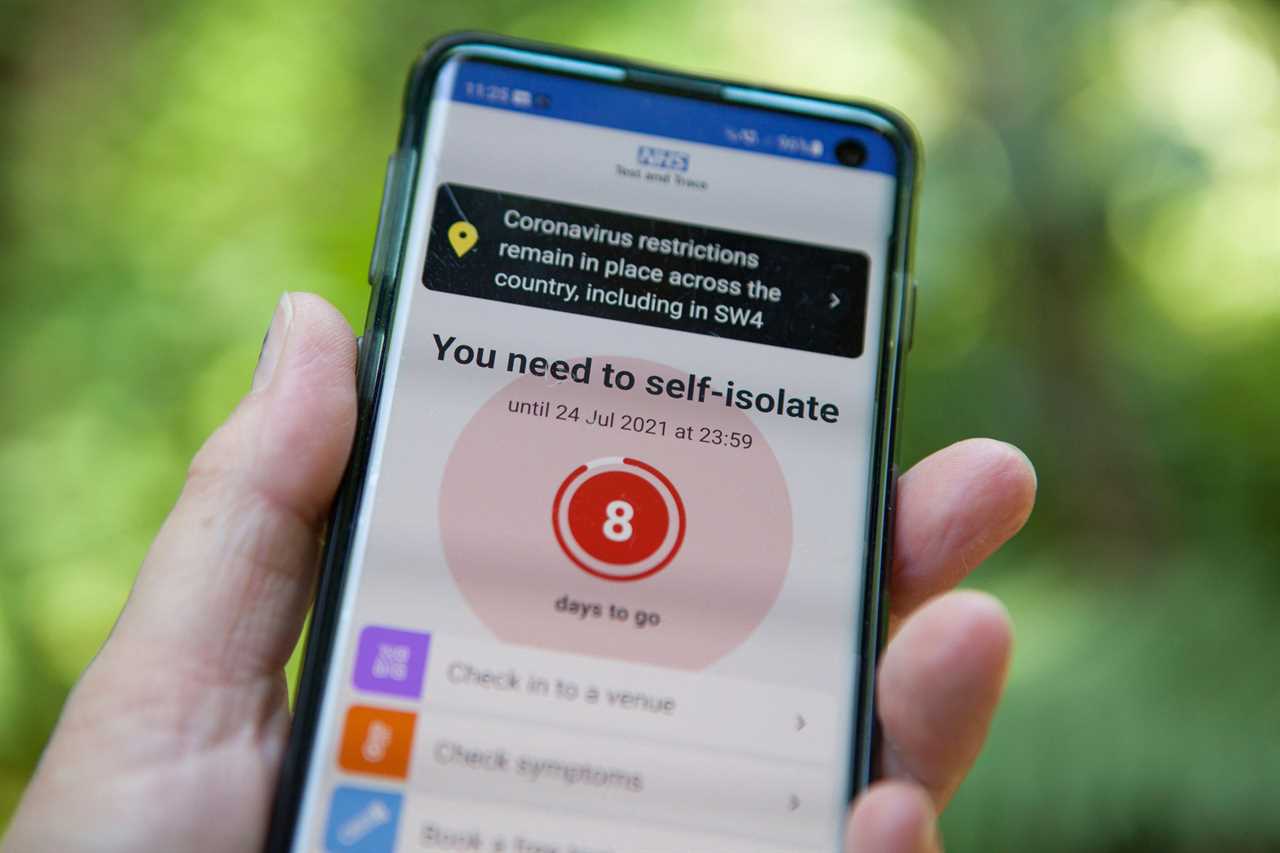THE full list of workers exempt from ‘pingdemic’ self-isolation rules has been revealed after fears the country could grind to a halt.
Staff in critical sectors – including food and water supply, medicines and public transport – can dodge 10 days quarantine if their bosses get permission from the Government.

Many workers will now be exempt from ‘pingdemic’ self-isolation
It will be welcome news to industries facing major staff shortages, with more than 618,903 Brits ‘pinged’ by the NHS Covid-19 app in just one week.
The Government has not published a list of essential workers – like it did in the first lockdown – but has identified vital industries.
The sectors included are:
- energy
- civil nuclear
- digital infrastructure
- food production and supply
- waste
- water
- veterinary medicines
- essential chemicals
- essential transport
- medicine
- medical devices
- clinical consumable supplies
- emergency services
- border control
- essential defence outputs
- local government
The updated guidance said “in the small number of situations where the self-isolation of close contacts would result in serious disruption to critical services, a limited number of named workers may be able to leave self-isolation under specific controls for the purpose of undertaking critical work only”.
The government’s guidance states that employers who feel their workers need to be exempt from self-isolation should contact the relevant government department for their sector.
‘NO BLANKET EXEMPTION’
They are also asked to provide information on the number of people who they want to leave self-isolation, the jobs they do and the impact that self-isolation would have on their business.
If a worker is deemed to meet the criteria then their employer will get a letter from the government telling them what measures they now need to follow.

Read our coronavirus live blog for the latest updates
Unless businesses have received a letter like this with the employee specifically named, then the exemption policy does not apply.
“This is not a blanket exemption for all workers in a sector,” the guidance said.
It adds that “in some exceptional cases” there may be critical roles in other sectors which could be agreed on a case-by-case basis.
Up to 10,000 workers are expected to qualify for the exemption scheme.
Separate arrangements are in place for frontline health and care staff.
Isolation for double-jabbed Brits who are pinged or contacted by NHS Test and Trace will end on August 16.
Paul Hunter, professor at the University of East Anglia and an adviser to the World Health Organization, told The Times: “To my mind it is very clear from the available evidence that the current requirement to quarantine following being pinged has little if any value in controlling the epidemic, especially if the person is fully vaccinated.
“I can see no value in waiting another four weeks.”
In response to the announcement, the British Chambers of Commerce said many businesses “face difficult weeks ahead” despite the self-isolation exemptions.
Hannah Essex, co-executive director of the BCC, said: “While the announcement of a process which may exempt select critical workers from self-isolation in England will be a relief to some businesses, it will leave many more still facing critical staff shortages and lost revenue as the number of people being asked to isolate remains high.
“Nearly half of the businesses we surveyed this week have had staff either off sick with Covid or self-isolating in the past two weeks.
“Businesses want to play their part in stopping the spread of the virus while at the same time striving to revive their business after 16 months of disruption and closures.”
SUPERMARKET SHORTAGES
In his Freedom Day speech, Boris Johnson name-checked a handful of industries in line for exemption, if the workers have been double-jabbed.
They included food and water supply, power supply, medicines, public transport, border force and the armed forces.
Fully vaccinated NHS workers have already been exempt to stop hospitals coming to a standstill.
Shoppers have spotted shortages in supermarkets this week, including bottled water and fresh fruit and veg.
Ice creams and beer are also among the items running low in some locations, as supermarkets warned customers not to panic buy.
A number of problems through the food supply chain have combined to create what’s been described as a “perfect storm”.
Increasing numbers of workers are being “pinged” by the NHS Covid app creating staff shortages in stores and factories producing food.
There is also a shortage of lorry drivers and fruit and vegetable pickers which has threatened supplies, while the heatwave has increased demand for salads, BBQ food and ice.
Some supermarkets last night warned the PM he has just 48 hours to fix the pingdemic or customers could face bare shelves for weeks.
Iceland said it has closed “a number of stores” after 1,000 workers – four per cent of its workforce – forced to self-isolate after being pinged.
Mr Kwarteng admitted the Government was “concerned” by photos of bare shelves in supermarkets, but said it wasn’t a “universal” problem.
He told BBC Radio 4: “Shoppers shouldn’t be panicking… I’m not panicking.”
BP has temporarily closed some petrol stations due to fuel supply problems, with M&S warning 20 per cent of its staff could be self-isolating by next month.
Pub chain Wetherspoons also warned it had a couple of hundred staff off.
Millions have been deleting the NHS Test and Trace app to avoid isolation as the Delta variant rips.
But Downing St has pleaded with people to stick with it, saying it’s “crucial” to lowering the spread.
 NewsSportPrivacy PolicyTerms And Conditions
NewsSportPrivacy PolicyTerms And Conditions
